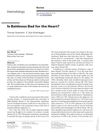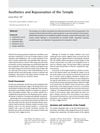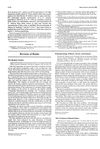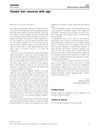 10 citations,
January 2005 in “Dermatology”
10 citations,
January 2005 in “Dermatology” Baldness may be linked to heart disease, but the evidence isn't strong enough to consider it a major risk factor.
 29 citations,
May 1998 in “Bulletin of the American College of Nurse-Midwifery”
29 citations,
May 1998 in “Bulletin of the American College of Nurse-Midwifery” The document concludes that menopause should be seen as a natural part of aging and managed with personalized care and informed choices.
[object Object]  14 citations,
May 2019 in “Experimental Dermatology”
14 citations,
May 2019 in “Experimental Dermatology” Fat tissue extract may help treat vitiligo by reducing cell stress and promoting skin repair.
 1 citations,
March 1954 in “Archives of dermatology”
1 citations,
March 1954 in “Archives of dermatology” Animal research has greatly advanced dermatology.
 April 1963 in “Archives of Dermatology”
April 1963 in “Archives of Dermatology” Dermatological conditions are complex and treatments often have mixed results.
 2 citations,
March 2021 in “Carpathian Journal of Food Science and Technology”
2 citations,
March 2021 in “Carpathian Journal of Food Science and Technology” Caraway, Chinese chives, and cassia may improve health and prevent diseases due to their nutrients and medicinal properties.
September 2022 in “Dermatology and therapy” Androgenetic alopecia is linked to heart disease, metabolic issues, and mental health problems.
7 citations,
July 2013 in “Egyptian Journal of Dermatology and Venereology”  January 2022 in “Sustainable development goals series”
January 2022 in “Sustainable development goals series” The document concludes that significant investment in agricultural innovation is necessary to achieve global food security and nutrition.
 December 2023 in “International Journal of Science and Research (IJSR)”
December 2023 in “International Journal of Science and Research (IJSR)” Herbal treatments are effective and preferred for hair loss with fewer side effects.
 13 citations,
January 2010 in “Advances in Biochemical Engineering / Biotechnology”
13 citations,
January 2010 in “Advances in Biochemical Engineering / Biotechnology” Understanding hair biology is key to developing better treatments for hair and scalp issues.
 6 citations,
April 2018 in “Facial Plastic Surgery”
6 citations,
April 2018 in “Facial Plastic Surgery” Treating the temple area carefully with combined methods improves facial youthfulness.
 32 citations,
September 1989 in “Medical Clinics of North America”
32 citations,
September 1989 in “Medical Clinics of North America” Skin problems are common in lupus, important for diagnosis, and can be triggered by sunlight.

The books were useful but had some areas needing improvement.
 May 2019 in “The journal of investigative dermatology/Journal of investigative dermatology”
May 2019 in “The journal of investigative dermatology/Journal of investigative dermatology” Age-related hair loss is linked to the decline and dysfunction of hair follicle stem cells.
15 citations,
September 2018 in “Hearing research” Rapamycin reduces age-related hearing cell loss in mice, but acarbose does not.
 6 citations,
April 2019 in “Journal of Cosmetic Dermatology”
6 citations,
April 2019 in “Journal of Cosmetic Dermatology” Hair loss affects women's self-esteem; treatments like minoxidil can help.
 April 2018 in “The journal of investigative dermatology/Journal of investigative dermatology”
April 2018 in “The journal of investigative dermatology/Journal of investigative dermatology” Ginseng and Albizia extracts may help prevent age-related hair thinning.
 August 2019 in “Journal of the American Academy of Dermatology”
August 2019 in “Journal of the American Academy of Dermatology” Ginseng and Albizia extracts help prevent hair thinning with age.
 61 citations,
April 2012 in “British Journal of Dermatology”
61 citations,
April 2012 in “British Journal of Dermatology” Caucasian women's hair appears thickest in their 20s, with perceived thinning after mid-30s due to both decreasing density and diameter.
 11 citations,
October 2018 in “The Journal of Dermatology”
11 citations,
October 2018 in “The Journal of Dermatology” Decorin helps keep hair follicle stem cells and may prevent age-related hair loss.
 December 2011 in “British Journal of Dermatology”
December 2011 in “British Journal of Dermatology” As women age, they experience changes in hair density and volume, face challenges in distinguishing normal hair loss from disease, and have limited access to treatments for hair issues.
 January 2021 in “bioRxiv (Cold Spring Harbor Laboratory)”
January 2021 in “bioRxiv (Cold Spring Harbor Laboratory)” Mothers have more hair proteins than their children, with age-related differences in protein patterns, and some proteins in hair could indicate early childhood development.
 3 citations,
October 1982 in “Postgraduate Medicine”
3 citations,
October 1982 in “Postgraduate Medicine” Most types of hair loss can regrow naturally, but there are no effective cures for male pattern or age-related hair loss, and only limited options for females.
January 2022 in “SSRN Electronic Journal” Mouse hair follicles age, causing more white hairs due to fewer pigment stem cells.
 February 2016 in “Aktuelle Dermatologie”
February 2016 in “Aktuelle Dermatologie” Low-Level Laser Therapy significantly improves hair density in women with hormonally and age-related hair loss.
[object Object]  May 2024 in “Journal of Advanced Research”
May 2024 in “Journal of Advanced Research” Communication between blood vessel and hair follicle cells decreases with age, affecting hair growth and blood vessel formation.
38 citations,
July 2020 in “EMBO journal” SIRT7 protein is crucial for starting hair growth in mice.
1 citations,
March 2005 in “Hair transplant forum international” Female pattern hair loss in women can be due to hormones or aging.
 January 2017 in “Journal of traditional medicine & clinical naturopathy”
January 2017 in “Journal of traditional medicine & clinical naturopathy” Combining trichology and homeopathy is effective for diagnosing and treating hair loss.
























